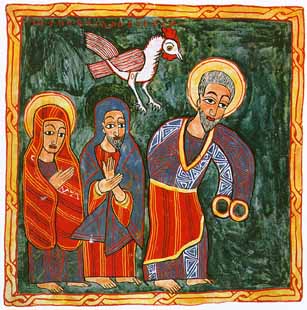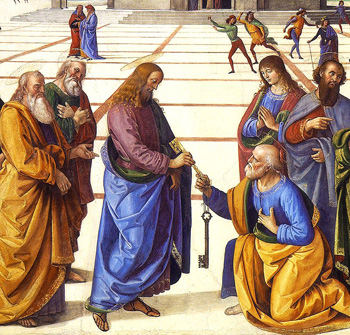For Sunday August 23, 2020
Lectionary Readings (Revised Common Lectionary, Year A)
Isaiah 51:1-6
Psalm 138
Romans 12:1-8
Matthew 16:13-20
Who do you say Jesus is? Don’t answer the question quickly; take your time. As Christians, we’re tempted to fall back on religious language we’ve inherited when we're asked about our faith lives, language we know so well, we could recite it in our sleep. Else, we’re tempted not to answer the question at all. We dodge and evade and perseverate, afraid of offending anyone whose perspective differs from ours. So, wait a while. Let the question linger. Who do you say Jesus is?
In one of his famous “letters to a young poet,” writer Rainer Maria Rilke encouraged his protégé to sit with what he doesn’t know, and trust that the questions themselves have great value. “Be patient,” he wrote, “toward all that is unsolved in your heart. Try to love the questions themselves, like locked rooms and like books that are written in a very foreign tongue. Do not now seek the answers, which cannot be given you because you would not be able to live them. And the point is, to live everything. Live the questions now. Perhaps you will then gradually, without noticing it, live along some distant day into the answer.”
In this week’s Gospel reading, Jesus invites his disciples to live a question. “Who do you say that I am?” he asks them as they make their way through the villages of Caesarea Phillipi. Who am I? Where do I stand in this life we’re making together? What do I mean to you?
Perhaps you object already. Perhaps you’re thinking, “No, that’s not the kind of question Rilke was talking about in his Letters. Jesus’s question is not a question to live with; it’s a question to answer. It’s a creed question. A heart-of-our-faith question, requiring absolute certainty and conviction. Jesus is our Savior. Our Lord. Our Redeemer. Our King. There’s nothing “unsolved” about Jesus; the Son of God isn’t a murder mystery. He’s the Way, the Truth, and the Life.
Yes. Yes, he is. And yet. If this week’s Gospel reading has anything to say about it, we are still meant to live the question of who Jesus is, day by day and hour by hour. We’re not meant to “solve” God once and for all. As odd as this might sound, we’re not meant to land when it comes to theology. To arrive and hunker down. We’re meant to journey.
 |
As Matthew tells the story, Jesus (being an excellent teacher) prefaces his zinger question with an easier one: “Who do people say that I am?” In other words, what’s the word on the street? What have you heard? What do the opinion polls suggest?
I don’t know about you, but I can just about hear the schoolboy relief in the disciples’ voices (“Ooh, ooh! This is an easy one! I know this one!) as they scramble to answer Jesus’s question. “People say you’re John the Baptist! No, no, they say you’re Elijah! Actually, some folks think you’re Jeremiah. Yes, but others say you’re one of the prophets!”
I’m guessing they go on for a while, each disciple trying to drown the others out with a more succinct, authoritative, and promising answer. Not coincidentally, the answers the disciples come up with are based entirely on the religious factions they’re partial to. To put this in contemporary terms, imagine them answering Jesus’s question this way: “Here’s the Lutheran take on who you are. Oh, and here’s the Calvinist one. Of course, the Anglicans say… No, wait, let’s hear what the Evangelicals think. And the Catholics! What about the Pentecostals? Or the Methodists? Or the Emerging Church? They have opinions, too!”
Interestingly, Jesus neither affirms nor denies any of the disciples’ answers. He simply listens, allowing his friends to offer up everything they think they know, based on other people’s preferences, ideas, and expert opinions. As if to say: this is an okay place to begin. This is where all explorations of faith begin, in naming what we’ve heard, examining what we’ve inherited, and parroting back the certainties others have handed to us. These answers cost us little; they’re safe and benign. They hearken back to history and tradition, and that’s lovely. But there’s no intimacy in them. No personal stakes. No investment, no fire. Naming what we’ve heard from others, repeating what we’ve inherited from our parents or pastors or peers — these are useful ways to start our explorations. But we cannot build our faith lives on hearsay alone. At some point, the question of who Jesus is, must become personal.
 |
So Jesus presses on. “But who do you say that I am?” Looking at each disciple in turn, he awaits a more intimate answer. Meaning: forget about other people’s theologies and interpretations. Put aside tradition and creed, valuable as they are, and consider the life we have lived together thus far. The bread we’ve broken, the miles we’ve walked, the burdens we’ve carried, the tears we’ve shed, the laughter we’ve shared. Who am I to you? How have you experienced me?
Matthew doesn’t give us much detail about the scene, but when I imagine what happens next, I see the disciples falling into an awkward silence. I imagine them avoiding eye contact with Jesus. Shuffling their feet. Coughing. Casting anxious glances at each other. I imagine every single one of them desperately hoping that someone else will answer first.
And I imagine Jesus, standing patiently and vulnerably in their midst through that long silence, waiting to hear what his closest friends will say about him. Do they know him? Have they learned to trust his heart and his words? How much have they comprehended of his mission and vision, and how much are they willing to confess out loud? Do they love him enough to make a claim? To take a risk? To speak truths that might cost them?
Cue Peter. Bold, reckless, earnest, impetuous Peter. When the silence becomes unbearable, he throws himself forward and answers the question as confidently as he can: “You are the Messiah, the Son of the Living God.”
A perfect, A-plus answer. The whole gospel story in a nutshell. The Truth with a capital “T.” Right?
Well, sort of. In this week's Gospel account, yes, Jesus commends and blesses Peter for his answer. Jesus declares that he will build his church upon “the rock” of Peter’s bold testimony. And he promises Peter “the keys of the kingdom of heaven.” All of this is true, and powerful, and worth celebrating.
 |
But it’s not the end of the story. We know from other gospel accounts that when Jesus goes on to describe the suffering and humiliation his Messiahship must include, Peter quickly backtracks, pulls Jesus aside, and tells him to shut up. Such morbid talk is not worthy of a real Messiah! Peter’s insistence that Jesus fit into his watered down comprehension of divinity hits a nerve so raw, Jesus turns and rebukes Peter with words that shock us still, two thousand years later: “Get behind me, Satan! For you are setting your mind not on divine things but on human things.”
As strange and stinging as this exchange is, I like what it teaches us about “living the questions” of faith. I like that Peter’s confession — “You are the Messiah” — signals the beginning of his exploration of Jesus’s identity, not its end. As soon as Peter thinks he has the answer to the question nailed down, Jesus shuts him up. Jesus challenges what he knows, and nudges him back to the starting line: Yes, I am the Messiah. But no, you have no idea what “Messiah” means. In fact, you’re not even ready to know what “Messiah” means; you can barely tolerate my talking about it. There’s so much more for you to learn, Peter. So many more answers for you to grow into. Be patient. Don’t force the locked doors. Try to love what is unsolved. Keep living the question.
When I think about the whole of Peter’s story — all the biographical details that we 21st century Christians have the privilege to know and ponder — I’m stunned by the answers that Peter must have lived into as time went on — answers he never could have articulated in the early years of discipleship. “Who do you say that I am?” You are the one who found me in a fishing boat and gave me a new vocation. You’re the one who healed my mother-in-law. You’re the one who said, “Yes, walk on water." You’re the one who caught me before I drowned. You’re the one who glowed on a mountaintop while I babbled nonsense. You’re the one who washed my feet while I squirmed in shame. You’re the one who told me — accurately — that I’d be a coward on the very night you needed me to be brave. You’re the one I denied three times to save my skin. You’re the one who looked into my eyes with pain and pity when the cock crowed. You’re the one who fed me breakfast on a beach and spoke love and fresh purpose into my humiliation. You’re the one who gave me the courage to preach to three thousand people on Pentecost. You’re the one who taught me that I must not call unclean what you have pronounced clean. You are the one who stayed by my side through insults, beatings, and imprisonments. You are the one I followed into martyrdom. You are the Messiah, the Son of the living God.
 |
Who do you say that Jesus is? Who has he been to you in the past? Who is he now? Who do you hope he will be in the future?
These are questions to ponder for a lifetime. Questions that have so many others folded into them, we’ll never exhaust the possibilities. What stories of Jesus have you inherited? What “truths” about him do you need to say goodbye to? What religious assumptions are you clinging to simply because they're familiar, or safe, or easy? Why are you afraid at times to answer the question at all? Why does it fill you with shame?
Is Jesus merely “the” Messiah? Or is he yours?
What Peter learns in this encounter is that Jesus is just as powerfully present in the questions as he is in the answers. Maybe even more so. To love what is unsolved is not to deny Jesus his Lordship. It is to allow Jesus to enter more deeply into your heart than any impersonal claim about him will ever do. Live the question. That is Jesus’s invitation, and he makes it over and over again to each one of us, in love.
Debie Thomas: debie.thomas1@gmail.com
Image credits: (1) I Am Not Ashamed of the Gospel; (2) Orthodox Christian Network; (3) Building Faith; A Ministry of Virginia Theological Seminary; and (4) Wikipedia.org.





